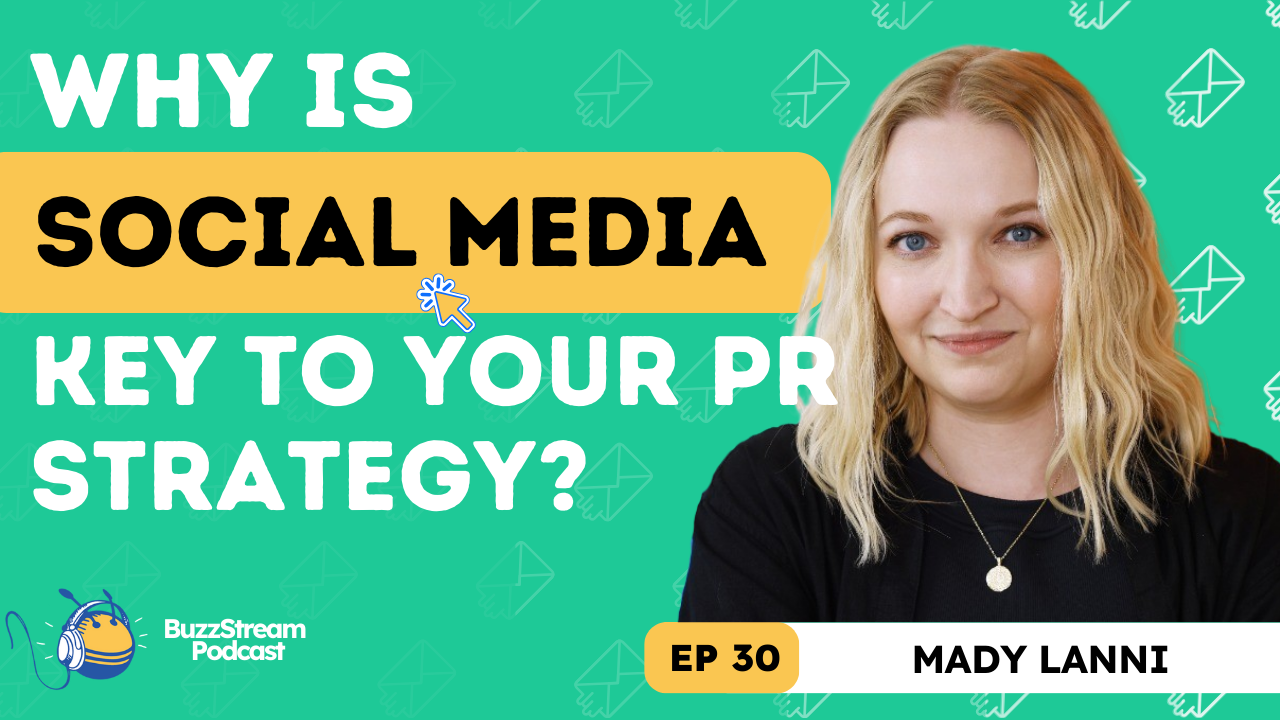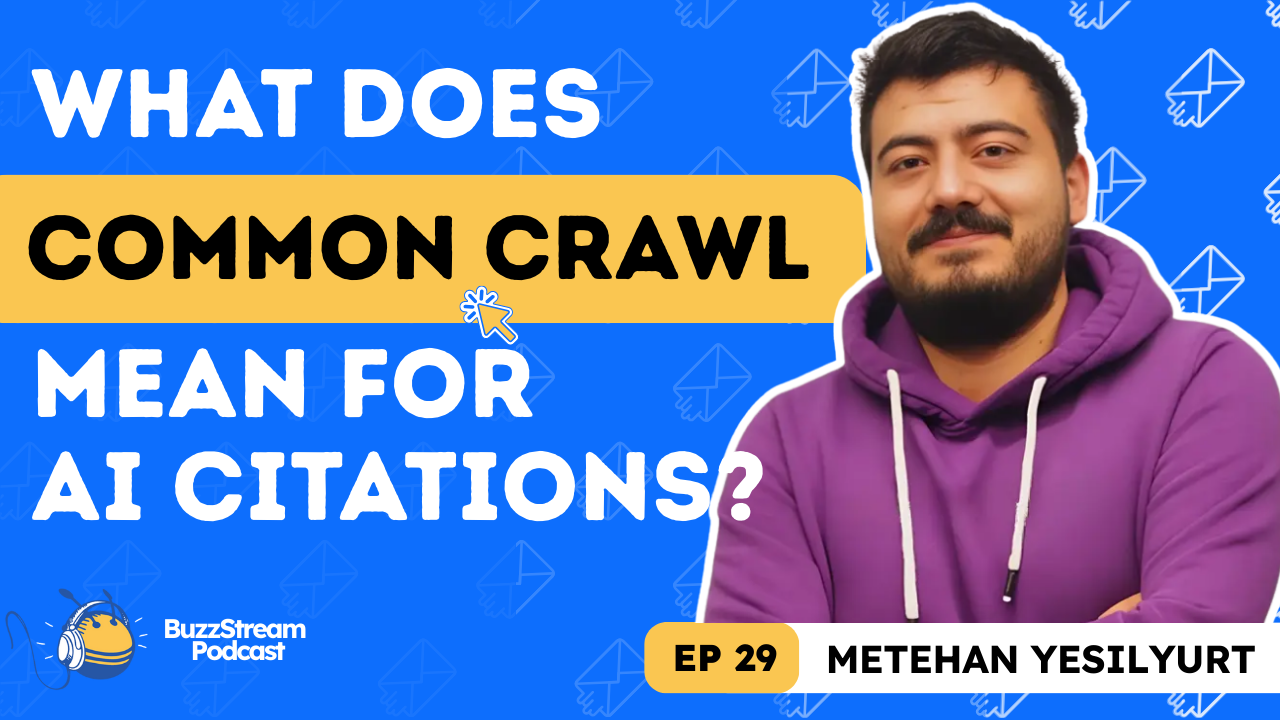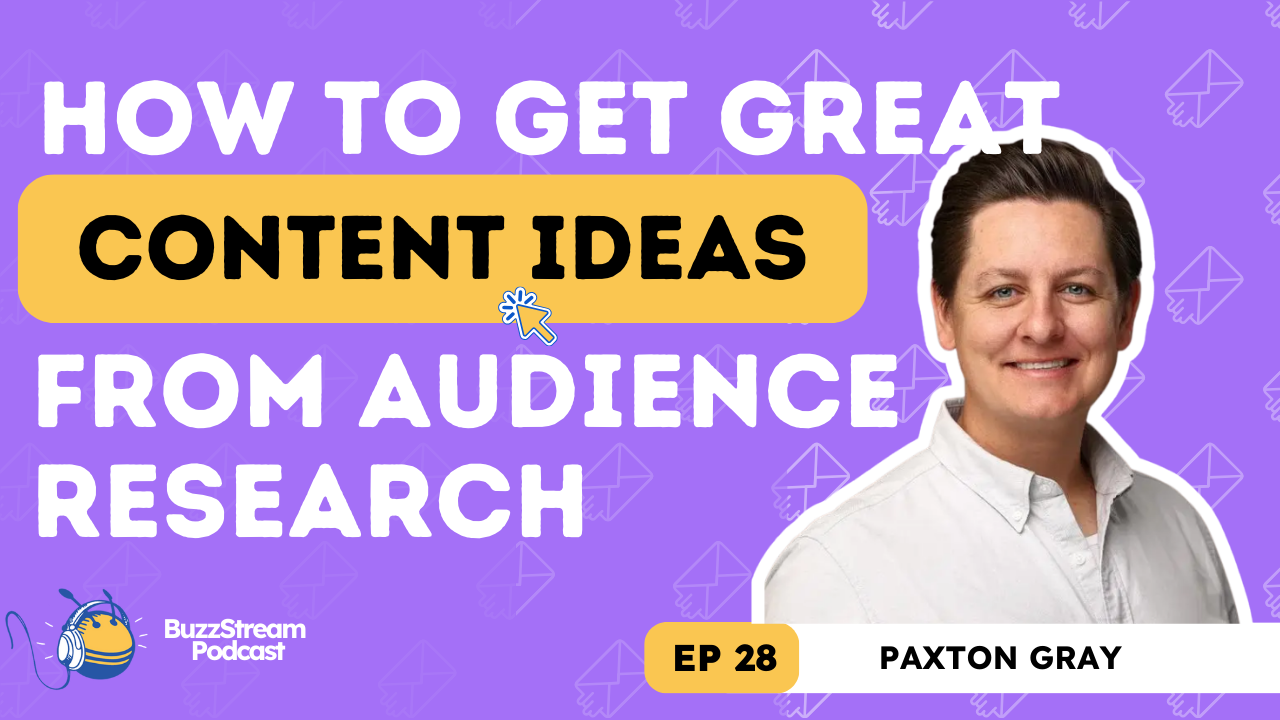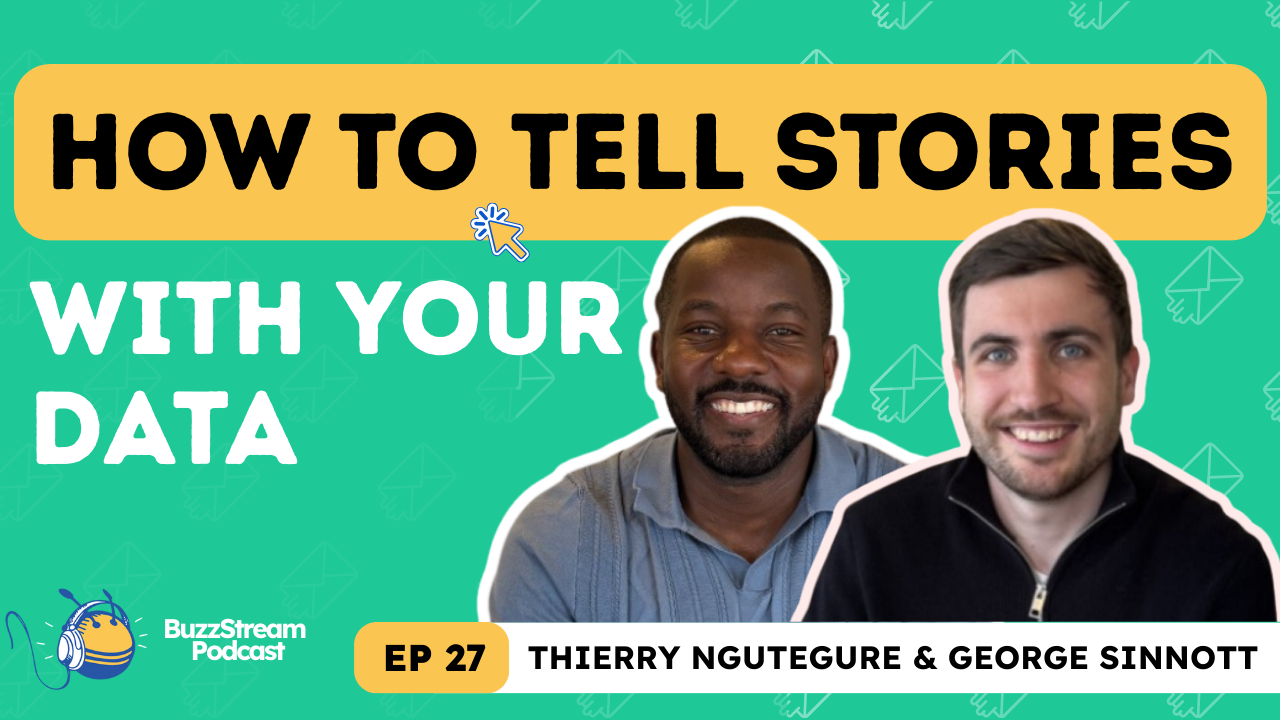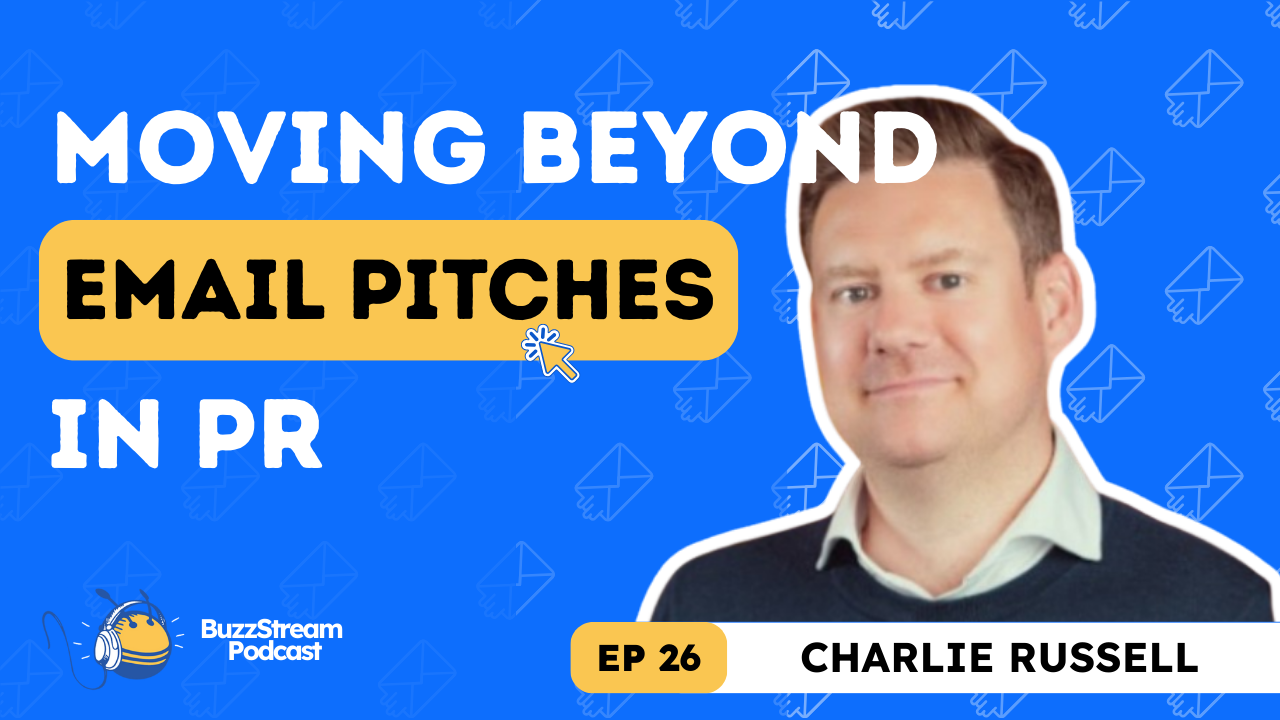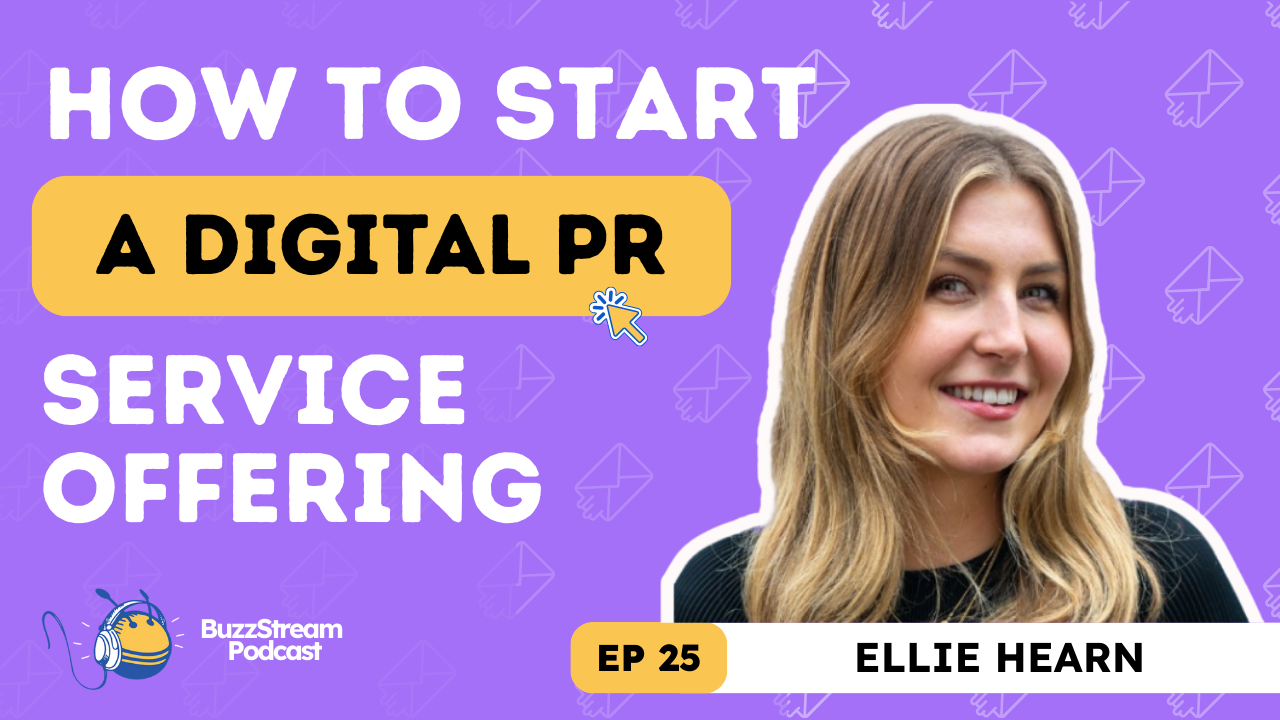Table of Contents
Want to rank in local search? Start thinking like a brand, not just an SEO.
I brought in Chris Brencans, CEO/founder of OntheMap.com, a local search digital marketing agency specializing in local SEO for industries like legal, medical, and home services.
In this episode, Chris explains how smaller businesses can use digital PR to punch above their weight and why real-world brand recognition is the secret weapon in competitive local markets.
From reactive PR to charity sponsorships, On The Map has created some awesome campaigns (shout out to Karla Fernandez, who leads their in-house digital PR efforts).
This one’s packed with tactical insights for anyone trying to win locally.
-
Ranking in the map pack requires reviews, brand trust, and local and authority links.
-
Digital PR allows smaller businesses to compete with big advertisers by earning media coverage through storytelling.
-
Data-driven campaigns work best when paired with a strong narrative and localized angles.
-
Reactive PR and expert commentary allow for fast link wins by tying clients to trending news.
-
Links from community events, local sponsorships, and giveaways are powerful and often overlooked.
-
Directory link still matter, but are just the baseline for local search competition.

Posts Mentioned in the Discussion:
Here are a few of the campaigns that Chris mentioned in our conversation.
- https://www.fox21news.com/top-stories/data-fatal-crashes-increase-after-daylight-saving/
- https://metro.co.uk/2024/02/13/pancake-day-warning-issued-leftover-batter-avoid-disaster-20269952/
- https://wjon.com/ixp/136/p/deep-frying-the-turkey-dos-and-donts-this-holiday-in-wa/
- https://www.newbeauty.com/sephora-makeup-tester-infection/
Below is the slightly edited transcription of our chat:
Was local search impacted at all by any of these algorithms?
Chris Brencans: So I’d say local search didn’t get impacted as much as other industries particularly. We still have local map rankings, and that’s what drives a lot of results in a local search.
We’re competing not just only for the traditional listings. The bigger task is to rank in the map results, and that requires more multifaceted approach. That’s why SEO is such a complex game. You can be e-commerce, SEO, and you can be local SEO for e-commerce. You have to worry about. Product listings in local SEO, you need to worry about map listing.
So each SEO side has its own unique angles. However, the algo updates, they did impact some of the traditional listings, lot more AI overviews. However, it wasn’t such a big impact, like it was for a bunch of affiliate sites getting wiped out. The players that were big in local space stayed big.
But I just I contribute that to the fact that The number of big players in smaller markets are already big players there, versus being an affiliate in some e-com vitamin space where you have only number of big players and everyone else gets wiped out. I. In local. It wasn’t such a big spectrum because there’s a lot more bigger players in these smaller markets.
And I can speak more on home services, legal, medical.
Those are big verticals where we are spending a lot of time, especially legal and home services. So big brands that are known in certain markets. These algo updates didn’t really make any impact on them. They’re already known there.
So Google’s ranking What they know that’s being searched. But we’ll get into some of those brand elements probably after some of your other questions.
Vince: Yeah. I guess the kind of good follow up to this would be how do links play a part in local SEO?
Do links play a part in local SEO?
Chris Brencans: Links play a big factor. Just like an SEO in general?
Yeah, but here it is the prominence factor. So even if you wanna rank in map results you are gonna need reviews.
You’re gonna need the trustworthiness, and that comes with the prominence of whether you have any big brand authority links coming back to your site. Do you have some local links coming back to your site?
And the best way to. Describe this as, just think about any big brand you can imagine in your local market.
Where were you from, Vince? I forgot.
Vince: I’m in Connecticut right now.
Chris Brencans: Connecticut. So just think about some big brand in Connecticut that everyone knows. And what is the link profile that big brand has?
So it’s combination of them advertising in the local market for last 20 years.
They have press mentions they have every directory.
They’re also listed on local sites because they do a lot of community outreach.
That’s the ideal natural link profile that you wanna have to dominate competitive local search results.
Vince: So it is still the same strategy of just understanding what your competitors are doing and trying to match or outdo them really.
For the most part yeah. It’s just like in different areas?
Chris Brencans: Yeah. And the thing with local is it varies so heavily from city to city, from Connecticut to Miami to New York.
The smaller the city and the less competitive the service that you’re advertising let’s say New York personal injury lawyer versus Connecticut swimming classes, it’s such a huge gap there.
So also the link profiles that you’ll need in each segment will be massively different.
Then you need to go after it. The New York Personal injury lawyer will need the big media mentions.
Every possible local link they can get, they will need to appear on news because the top ranking lawyers are doing that.
They’re actually publicly known figures. So if you wanna beat them. You need to be able to replicate that.
And that’s the interesting part.
What I think you’re referring to is saying, wow, I’m noticing a lot more digital PR activity in US.
Big brands, they’re always been doing that, but now what’s happening, the smaller, the lower market is now coming upstream saying, “Hey, the guest posts we’ve been doing are not working anymore.”
We need a way to catch up with the big players.
That are just naturally gaining this, yeah. They do some big media campaigns.
For instance, there’s a big Detroit attorney Mike Morris, so he did NFL sponsorship deal with bunch of Michigan football team players.
And they’re appearing on his billboards.
They’re appearing in his TV ads.
Links just naturally come to those type of advertising efforts.
So that’s who you are up against. So you wanna replicate his authority and prominence. You need to tap into some creative ways, and that’s where we help our clients figure out what is this middle ground?
You still want to compete with him. But you don’t have such advertising budget yet.
There are creative ways like digital PR to still build the link profile.
So you could beat him, maybe not one to one on every single keyword, but finding certain pockets where he’s not as strong and then you can take some ground away from him.
Vince: Yeah, I, that is one of the things I do like about digital PR. Like you said it’s a level playing ground.
If you have a good story, I don’t think a journalist is necessarily gonna be picky.
Whether you’re the, a super well-known lawyer or a super small lawyer, in New York City or something.
It just really depends on the story.
So I do like that about digital PR and with most journalists I’ve spoken to, they echo the same thing where the story is king.
It doesn’t necessarily matter unless you’re a plumber pitching a story about whatever football or something like that might not make sense, yeah.
But even in some of those cases, the journalists that don’t have time don’t necessarily seem to care about some of those.
I think a good segue now would be to just talk about some of these strategies that, that you’re starting to mention.
Building strategies for local businesses that you either know, have seen, or have employed, or maybe some of the stuff that you guys are doing on the map.
What are some good Digital PR strategies for local businesses?
Chris Brencans: Yeah, actually I it’s been a very fun learning experience for myself at OntheMap.
We’ve always been big believers in building in-house, whether it’s tools, teams, we just go ahead first.
So I’ve worked with a lot of vendors in the past, but then we took on the challenge to actually build our own team.
So I’ve been very thankful experiencing this.
Year one was painful experiences, learning, and actually big shout out to Mark Rofe. We hired him as a consultant to just come in and kind of help us show the ropes because we were just going ourselves and it was like literally walking in the woods without any compass.
Nothing.
Just we almost hit a point where we stopped believing in digital PR.
But then I hired Mark and “he’s oh guys we gotta clean up.”
And the big learnings from Mark and then we’ll go further.
Like where that journey has taken us.
Big learnings with Mark initially was that you need to be really targeted when it comes to pitching your story to the journalists.
And I think our starting point in this journey was data-driven campaigns.
And I think it’s easier for everyone to understand what that concept is.
So we started doing data-driven campaigns, and the first most successful campaign was the Unhealthy States of America.
This is for a personal injury attorney who actually focuses a lot on different types of medical malpractice cases as well. So, for them, unhealthy estate medical malpractice works pretty well together.
Yeah. Now you might start thinking like, ooh, this, will this align locally?
In ideal scenario, and we actually had a scenario like this, a data-driven campaign showed that the worst state was the state where our client was in.
So that’s where we could get the most links in on healthy estate.
It wasn’t the case.
The clients in Indianapolis, they weren’t far off, so it was still good, but really what Mark opened our eyes to was saying, “Hey, so you have, your ranking is 49 states, so you have the worst states and the best states journalists want to talk about the worst. Find the states that are the worst and now pitch.
Tell ’em, oh my God, your state is the unhealthiest state in America.”
And guess what?
Journalists pick it out.
I’m like, yes, great.
Something bad to write about.
And that was such an eye-opening experience for us.
Understanding that data without story really doesn’t do anything.
But if you can put it in perspective and craft that message in your email with the quote, with the screenshot just laid in front of them saying, “Hey. Pretty much hit publish. You’ll Succeed Now.”
That was starting point.
Then we brought in our digital PR.
And she has learned tremendous things to me and basically told me like, all right Chris, now get outta the way. Carlos Hernandez, she’s amazing.
She was one of the first employees that Rise at Seven in the US and now she’s leading our department.
And so she’s structuring our workflow in a three-dimensional way.
We do reactive PR expert commentary and data-driven campaigns.
Honestly, the data-driven campaigns are like a slower-moving target, right?
It takes time to develop them, but then you can pitch them for a while.
The reactive PR and expert comments are almost like daily monitoring.
We have Slack channels just blowing up.
So one team is monitoring social media trends, and they’re trying to pick up different, interesting things so that now we can connect with our client, saying, “Hey, here’s our client.”
Talking about certain social media trends, I’ll give you some funny examples that we were able to land links on for one of our clients.
There’s a trend, not a trend, but a news piece about a Sephora makeup tester warning.
So if you’re using the Sephora testers in Sephora stores, they actually have bacteria, which could be bad for you.
Okay. So we landed our client a link on newbeauty.com, which is DR 78.
It was just his comment on “Hey. This is a trend. Th these are things people talking about on social media.”
The more current events that were happening for one of our clients, we got our links for daylight saving times and car crash risks.
So there’s daylight savings when it happens.
The darkness comes out earlier, so people are still tired in the morning, so chances of getting in accidents actually increases.
So we put super simple quick data together and she got five news stories, like actual news segments that she was on TV and her brand was getting picked up by these Fox 22 Penn Live, Las Vegas Review Journal.
And it was again, this kind of just monitoring of what’s happening in news.
And aligning our client with that new story. This way journalists sees the connection.
They’re like, wow, okay. Actually this is an interesting trend.
We can do something with this.
Let’s bring this person on.
Vince: Chris, can I real quick too to jump on those two examples you gave? So with the first one the Sephora. Who the expert? How do you make that connection?
Because I know, you have a lot of local, it’s like local plumbers and lawyers, like you said.
Like dentists, that kind of thing.
So what are you looking for? Do you have a feed that’s here’s all our plumbing-related topics?
Or is it more, “Here’s what’s going on.” Okay. This might work for our plumbing client.
How do you know what trends to jump on?
Chris Brencans: Yeah. So this, the Tic TikTok Sephora one was just ’cause personal injury attorneys deal with a lot of different types medical malpractice.
In this case, this attorney also does consumer protection.
So in this case we just pitched a quote from him.
And here’s the quote, “was a real threat to health and safety. Mike Eggers, managing partner in personal energy lawyer at 844c, Mike issued a word of caution to impressionable TikTok users.”
So that’s just one.
And there’s a couple other ones.
We had, another funny one was actually this is a really funny one.
Not really funny for us, but there was a TikTok trend where people would do. It was called bathroom sink trend. Where people would like, pretend like they’re standing on bathroom sinks.
So we issued a warning from our same attorney that, “yeah, actually by doing that you can really, not that it’s common sense, but you can really hurt yourself.” I’ll send you the links afterwards.
Vince: But it’s a good one for plumbers too, probably, right?,
Chris Brencans: Actually yeah. And it was the expert warn experts warned viral bathroom mirror, TikTok trend could lend you in hospital.
Vince: Yeah. It’s common sense, but I’ve seen I feel like I’ve seen a lot of those.
Yeah you’re like light.
I don’t know if it’s just because I just had some coffee or because these are giving me some good ideas, but I feel like the trick here is just finding what, like you said, like simplifying, but finding that newsworthy thing.
A couple of the ones you’re saying it’s like leaning into the emotion of like worst cities, like that’s gonna draw some emotion out of a journalist. Yeah.
This like the fear of falling or that kind of outrage of these TikTok trends and like the how dangerous they might be.
I feel if you’re looking out for that kind of stuff, you’re gonna do well with digital PR.
Chris Brencans: It sucks, I don’t wanna watch news ’cause it’s only negative. News stories. Stories. But that’s to an extent, that’s what news is. And so you have to Yeah, just hone in on it. Unfortunately, yeah. If I look at some of the other examples I have here for you, even the data driven one.
Road rage capitals of US.
This answers your initial question. How do you build links? For boring niche and in the local area?
So in this case, this client is in Texas. Actually number one, road rage capital is Houston.
So it perfectly matched up ’cause they’re all statewide personal injury firm.
Right? And this campaign landed 15 links and 200 syndicated links.
So it was a very solid campaign compared to just trying to build guest posts and going that whole, old type of stuff.
To me, that’s wasted time, wasted resources.
For highly competitive markets, this is the stuff you need to do because you’re competing against Mike Morris and the likes that are just running TV ads and doing all just real life viral campaigns.
They’re at Michigan football games hanging out with football players, getting just natural press mentions.
So if you wanna compete with that, you somehow have to replicate it.
But if you can do, let’s say one data-driven campaign a month, and you can launch reactive PR campaigns, and you end up landing like 10, 15 high authority links each month.
And even though some of ’em will be repetitive, plus you have syndicated links, you do that for a year.
I would put ourselves next to that big spender.
And you’re spending fraction of that money.
Obviously you’re focusing maybe just on SEO and PPC versus someone who’s doing a lot more traditional ads.
Then the next battle is gonna be the brand search volume because Google’s gonna recognize that their search more than you are.
But now at least you have these high authority links to showcase that, hey, I have prominence too. I am being recognized in news only I’m spending fraction of the money he’s or she’s spending to build a similar authority and gave him those type of rankings and recognition in, competitive SERPs.
Vince: I wanna get into some of the, like the guest posting stuff and a couple of these other tactics, but before I do, I want to make sure if someone’s listening, they’re a local brand they’re a dentist or something, can you help break down kind of the step by step?
So say you see a trend, say it’s some TikTok trend, is it just a matter of asking, what can I say about this?
How do I connect?
If it’s eating some weird food or something, so then what are the next steps? Is it like, okay, I just need to formulate a quote and then find a relevant journalist?
Once you identify a trend, what’s next?
Chris Brencans: One, you need to position yourself as like, why would they care about your opinion?
So it is expert and you’re combining the reactive and expert commentary in this approach, which is clever.
And then you need to find journalists that write about, they have written about something similar and there’s ton of like search operator little tricks you can use.
Mark Rofe has a whole playbook on that.
So then you have to get into building your journalist list.
And then you pitch them, find their email, and write a clever note.
How is that gonna work?
It’s a grueling process, and that’s why links are so valuable. The stuff you can buy is not really working anymore.
But to craft a list of hundred journalists and find this topic and then pitching them and then realizing. Oh man. Crickets. No one cares.
That’s also when you need a little bit preexisting relationship with these journalists too.
Because what’s starting to happen with our let’s say the 844C Mike, now he’s getting recognized as this guy who’s commenting on different viral trends and pitching journalists because next pitch we put out on his behalf we are already listing, “Hey, oh, by the way, Mike’s been quoted already here.”
Or if we have a journalist or we have a client that’s been on news segments, when we pitched them, we’re like, “oh, and by the way, was on this news segments.”
So now they’re like, “wow, okay. They look really good on camera. Oh wow.This is not a brand new persona. They have a real expert opinion. Let’s bring ’em on.”
And this is just an added benefit. But I love doing this for our clients.
Whenever we get those publications we’re able to put ’em on our, on their sites, saying “as seen in.”
Attorneys love it.
I’m seeing in all these new segments, but it’s true trust signal.
It helps conversions when someone lands on their site, who are they? Who do they want to talk to? Someone that’s actually been on news, that’s, it’s huge.
People connect with those big brands, they start associating you with that big brand.
Vince: Yeah. That’s really key. And I love that connection there to the site and, maybe even the bottom line, right?
Like you’re utilizing some of these relationships you’ve made and these links in other places.
Maybe you can create a reel or something for yourself of all the spots you might have gotten on tv.
Some of these reactives can lead to, or these expert commentaries can lead to actual TV.
Chris Brencans: That’s the daylight savings time. We got five actual news reels for our client. It’s gotta be killer for that just one, just that one pitch.
Vince: More like daylight savings time was occurring and then you went and found a statistic that tied into that and then pitched that statistic?
Chris Brencans: Yeah. It wasn’t like a big data-driven campaign, it was just, “Hey, yeah. A single, this is something we can connect the dots. Let’s do it.”
Vince: Yeah. I love that. Doesn’t have to be such a big thing. Yeah. Okay, so you touched on the reactives, the expert commentary, the bigger data-driven studies.
What else? What do you, what else are you doing for clients to build links? Are directories still a thing?
Are directories still a local SEO link building tactic?
Chris Brencans: Yeah, directories work and that’s, I don’t call that really link building, that’s more third party site management if you like, okay.
They’re common and it’s super important.
Local SEO, we have a whole department that worries just about citations because if you’re an attorney trying to add additional attorney on one of the legal directories, it’s a whole process because they need to prove your bar number and they need to confirm it.
The clients need to get on a call, like it, there’s a verification process.
It’s a little bit of a pain.
Yeah, but that’s minor.
It is just regular processes.
Are there other link building strategies?
Chris Brencans: A more evolving trend in local SEO is community outreach and participation in community events because Google wants to see some local signals that you’re a real brand.
Some cities and interesting things that some attorneys are doing—not just attorneys. I just work a lot with attorneys, so that’s the first vertical I go to. But there’s a ton who this equally applies to— home services or any local-based business dentist for that matter…
Different little charity events.
Could be Turkey drives if you’re doing a Turkey drive, letting all your local newspapers know that, “hey. On so and so date, you are gonna be giving Turkey giveaway” so then they can promote your Turkey giveaway.
And they’re not really gonna say, “Hey, oh, let me charge you for promoting this because it’s a charity you’re giving away other clients.”
Also doing similar things like school drives, backpack giveaways.
So that’s an easy pitch for your local news stations.
Another really go-to one is when big holidays are coming up free uber rides to avoid drinking and driving.
So you announce it, “Hey, we’re doing Uber Ride giveaways. Go to our website.”
Here’s the links and you pitch that to a bunch of journalists, and then they’re all gonna be linking back to your Uber Drive page so they can claim the Uber rides, right?
Realistically, not even that many people claim them, but it’s a good way to to promote some, some good calls and get links in return.
Vince: It’s so funny because what that sounds like is just like such obvious, like PR, marketing stuff, but I feel like, and myself included, like SEOs, it’s so easy to get tunnel vision with the stuff you’re doing right.
And you don’t think about some of the obvious things.
And it’s also funny thinking about how people will go to like scholarship link building, that, that was a big thing.
It’s like you create a scholarship and then that’s along the lines of the same thing you’re talking about, but it like, it got spammed to death.
It got taken over by the link building Army.
But yeah, I think getting back into that mindset might benefit a lot of SEOs and a lot of businesses where you’re thinking about it on a personal level.
It’s what can I do? The Turkey drive?
Sponsor even a 5K or something.
And you usually get a link on that page.
It’s the association with the local businesses, and that’s all semantically going to help you in the long run.
Chris Brencans: That’s what’s happening in local search because, I want to go back to the point I made earlier, you are competing usually, the brands winning have been around for a long time or are spending the most money.
And what they’re doing, they’re just everywhere.
They’re doing the traditional advertising that’s been working for them.
They were one of the first ones with billboards.
One of the first ones with TV ads, one of the first ones with radio ads, and they have this cash flow and what else they’re gonna do.
Then they’re all in community.
They have dedicated teams to be in every community event out there, just continuously promoting the brand.
Then what else can we do? Okay, let’s throw concerts. People throw concerts.
Find a popular singer.
Promote the concert. So and so attorney Vince Nero is doing a concert with, I don’t know. Alicia Keys, right?
But it’s a big thing and it’s a charity concert.
It doesn’t cost anyone any money and what’s happening, you are getting this organic press and you are actually bringing the community together.
If you pull it off, SEO becomes a lot more grassroots marketing.
Traditional marketing.
But in local, you have to do that now especially in the highly competitive spaces, the less competitive, you can get by with local directories.
Couple authoritative links maybe do a couple community events or another easy thing to do.
And this is nice, this is like actually again, charity sponsor every possible local youth sports team.
Soccer, basketball, volleyball, churches, humane societies, fire fighters, police—the ideas never end because there are just so many local organizations that will gladly take your money and, in return, give you a link.
And it’s all going to be low-logo and funny things.
Sometimes there’s sidewide links.
Vince: What is the average sponsorship size?
Like, how much should people expect to pay?
It sounds like it’s going to be related to whatever their competitors are paying.
What does a sponsored event cost?
Chris Brencans: So if you want to really, if you’re in a crowded market, you’re gonna have to spend a little bit more.
So from like more smaller organizations will take $250, $500 to like some more prominent organizations that have figured out the system.
They’re gonna be like, okay, it’s $2,500 a year, but that would be a really author site and you might get a home for $2,500..
Vince: It’s wild when you start to think about it that way.
You might spend like when I was at an agency, it costs 5K, 10 K for a campaign, right?
And if that campaign generates, say it costs 10k, generates 10 links, a thousand dollars a link.
Most agencies, or sorry, most marketers think along the lines of cost per link because that’s such an easy metric.
But then if you’re thinking outside the box, it’s okay, I could maybe spend 10 grand sponsoring this thing that’s going to, that give me a lot of press, and then there you gotta get my pen links through press, naturally.
Yeah. It’s just like such a different mindset and then mindset.
Chris Brencans: Those links would be a lot more expensive. You try to buy it.
Vince: Exactly. Yeah. That’s we’re so cost per link goes down.
Chris Brencans: Yeah. Absolutely. Yeah. And also just, this is fun one just. Tip all these sponsorships, they can be tax write-offs if the client pays for.
How many sponsorships did we give out?
Vince: How do you make a link, link building out of tax write-offs? Maybe that’s a post I can write.
Chris Brencans: Hey. It’s a charitable donation. So yeah, you’re, it’s you’re basically free, right? Investing local, yeah.
You’re supporting local youth teams.
That’s a big thing in Europe, I think in US too. Just sports team sponsorships.
They get big sponsorships from corporations, and then because of their sponsorship of the sports teams, they get tax relief because of that.
So instead of spending the money, like just paying tax, not just, paying taxes, you have to pay on your profits, but instead of that, they’re investing that as sponsorships and now they’re getting brand recognition through these sports organizations and they’re using them as platforms to.
Build their audiences.
Vince: Yeah.. I guess ultimately it’s gonna come down to how much time you have to devote to something like this, right?
If I was a exterminator. I’m here in Greenwich, Connecticut, I wanna start a new business. I don’t have a ton of money. I want to understand I know these tactics we’re talking about.
It would be great for me to go out and create a reactive campaign. Digital PR campaign, but I don’t have the time.
I’m killing bugs. I’m going door to door.
But if you were to give tips, like advice to someone, your friend who was starting this.
What are the first three or most important things, three most important things to do from an SEO perspective?
What are the first three things to do when starting a local business from an SEO perspective?
Chris Brencans: Most important thing is your local business profile, like the Google business profile, that’s your gold mine, because especially for like services like exterminators, people gonna look at the map listings and they’re gonna read your reviews. So flushing out your profile with images, your logo, yourself, your team, your happy clients.
That’s, you are already winning if you’ve done that.
Okay. And then generate as many real reviews as you can, because now with AI, the authenticity of reviews and images, if you can add, if your clients can add images to reviews, there’s even a little plugin that lets you integrate the plugin in your website.
So when people look at your review reviews on a website, it pulls actually different locations where you did the jobs and shows the images what you did.
So the review on authenticity is massive.
So that’s number one.
Number two, if you wanna rank in those in map results, you’re gonna need directories.
So just look going through directories that you put in exterminator, see just what directories are ranking because there’s gonna be a ton of them ranking.
So, getting all those directory links then whatever other local ones you can figure out that’s starting point, and then start watching where your rankings are just with that itself Greenwich exterminator.
I haven’t really analyzed that SERP.
But I imagine you’re gonna need some little bit more authority of links afterwards.
So that’s when you need to start getting a little bit creative.
I think doing a little bit local sponsorships would be a good starting point, just because seems like the most bang for your buck, right?
In this case. And low effort at least.
Yeah, because are you really gonna go craft news stories yourself, right?
Or I don’t foresee this particular exterminator having, unless you’re like a multi-city operation then you probably would have some budget for PR type of link building.
But in this case, just local links would go, I think, relatively long.
And then if you’re still finding the gaps I will talk to some SEO consultants to figure out, all right, what could be my possible what else am I missing?
But I think within, if you are getting reviews, you are getting directories.
We would just need to figure out how to get a little bit of brand search as well.
Because if you get the brand search, that almost serves better than links because Google knows you’re being recognized.
That’s where you need to brainstorm a little bit more, seeing what competitors are doing.
Maybe even PPC ads.
Honestly, if you’re trying to get business, it’s more about actually getting the clients right away.
Some people are just like, no, I want to build SEO.
Okay, cool.
But you could run some like social ads just to boost the brand search one, some kind of creative campaign saying, “Hey, type in our domain and fill out the form, rather than sending it to them.”
Yeah. That’s, that’s the extra layer, but I think just the three, like what anyone can do themselves, basic is Google business profile reviews with images.
Obviously the optimizations, but it’s like not that hard.
Have your primary category, your main service and have your name listing accurate with your directories.
Build the directories and then do some local sponsorships. I think that can go pretty long way, and you just need to track your results.
Uses a GEOGRid rank tracker if you need one checkout track. We actually built our own, it just shows your map rankings in a certain proximity because the map rankings will differ based on wherever you are in Greenwich.
Google’s smart enough to tell you like why would you travel across the entire city if there’s someone nearby and also terminators kind of service area based businesses, so it might be a little bit different.
You don’t really need to go to their office. They come to you. But still those are smaller things.
Vince: The pro tips, man.
I wanna leave listeners with one more thing. Your take on this: So like I mentioned this at the very beginning, there seems to be a lot of potential for local businesses to be pitching local news sites.
Now, I heard something yesterday from another podcast guest that made me think back about this, where he was saying in a lot of cases the local news sites might be more taxed in terms of they, they’re overloaded.
It’s less people working and there’s more news to cover, but still, there are just so many local news sites nationwide.
So if you are a larger company that has, like, say you’re a rental company or something, that has local areas, local Hertz or something, all across nationwide… it still feels like pitching to local news seems to be a lot of potential.
Do you think there’s a lot of links to be had from local news?
Do you think local news is getting too crowded, or is there still a lot of potential?
Chris Brencans: No I totally get your point. And when I started with digital PR, I thought that was the goal to move, just connecting our clients with the local journalists.
But the reality is that it was super hard to have this highly irrelevant message for them to talk about, and that doesn’t feel commercial.
It’s, they don’t really care that you’re in Miami and the journalists in Miami, unless you have something highly relevant to, like the core concepts we talked about don’t really change right now.
What you could do is you could do some advertorials that could work.
Maybe some kind of in-person news segments you can try to develop that.
I’ve seen some of our clients work with new stations to be on certain segments on a consistent basis, and they become like ongoing guests of whatever show, but that costs money, and it’s a little bit different type of link building.
You’re not reallypitching PR stories, you’re just now working with the local news station.
You’re saying, “Hey, I wanna advertise on the local news station. What can you do for me?”
Vince: Yeah. So it sounds like it’s more opportunistic when you’re thinking about local news if you’re in that area.
Unless there’s an opportunity or you’re creating one based on a reactive idea that you’re connecting the dots.
You shouldn’t rely on it solely for links. You gotta be thinking about other areas.
Chris Brencans: And it’s also it’s already hard to pitch just journalists in one state.
Now if you try to pitch journalists just in one city, you’re just like, your chances of getting picked up get super slim unless you really have something highly relevant.
But that goes back to the whole concept of relevance of the story to get that story picked up.
Vince: Yeah.
Chris Brencans: Yeah, we love the local news stations, but we don’t isolate them out just for specific kind of story, unless it’s like the Uber ride giveaway or Turkey drives or backpack giveaway, that highly locally relevant activity you’re doing pitching that makes a lot of sense.
And to them it’s “oh, that’s great. Okay. Let’s promote this.”
But if there is no real kind of direction or value of what you’re pitching, what are you gonna really pitch? Yeah.
What’s the story?
Why, right? ’cause we’re both in Greenwich, like no one cares.
Vince: Yeah. It gets back to what we said earlier, just you need that story. There’s gotta be a good story.
Chris Brencans: Now Vince, what you will find out is that there are, companies that sell links on those local sites.
We all know about that world of SEO and I think there’s a lot more now, these high top tier type of link building vendors that have found contributor weird author access thing.
Yeah.
Vince: Yeah.
Chris Brencans: And you can find those type of link buying opportunities like that’s out there.
Then the local play becomes a lot more relevant, ’cause now, Hey, $1,500 and here’s your link.
Vince: Yeah. Yeah. Yeah. It’s be interesting to see the next couple years, like how some of this shakes out.
I just don’t have as much faith in those types of links these days, just ’cause I feel like people’re just getting smarter at smelling, sniffing those out.
But, the behind the scenes partnerships and relate handshake deals that some of these publications have, they gotta make money somehow, that’s the way they’re doing it then.
Seems like the natural way to go is probably better in the long run.
Chris Brencans: I think we’re seeing that SEO is becoming more of a brand-building activity, and we’re just trying to build a brand with additional effects.
Those are links and brand search volume that’s gonna help your actual rankings because people, at least in local SERPs.
They are the ones ranking are the ones that are being recognized in real life.
And the first time I heard this was from Blake Denman. He’s huge in local SEO.
He’s one of the OGs, so to say. And he said this to me, I think four years ago four or five years ago.
If you’re recognized in real life you’re gonna rank in maps, you’re gonna rank in the local space.
And unfortunately, but reality is, it’s a lot of the big advertisers, the billboard attorneys, the billboard contractors the ones with TV ads.
That’s where we can come in with some creative ideas and campaigns to level the playing field.
Vince: Yeah, level the playing field. That’s what it’s all about.
I think that’s probably a good place to stop. Chris, I want to thank you again. This has been awesome. I just wanna remind everyone to like, subscribe, share a comment, rate the podcast, interact with this stuff.

 End-to-end outreach workflow
End-to-end outreach workflow


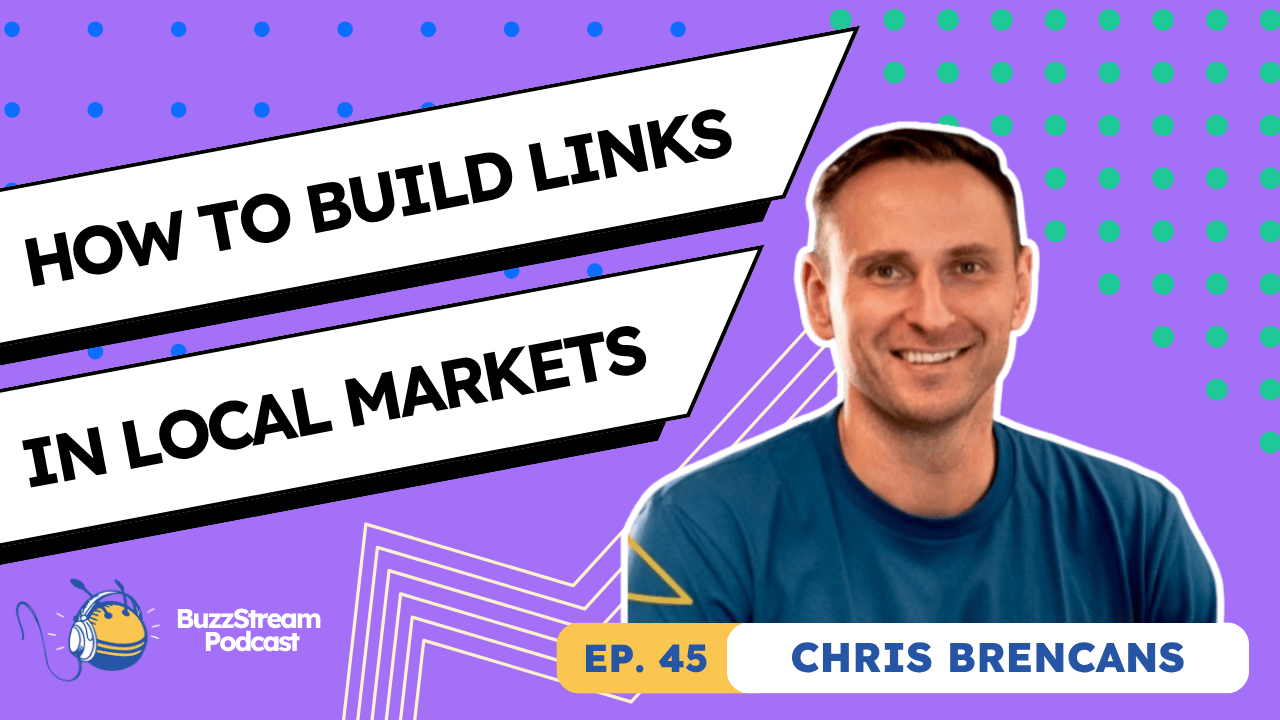
 Check out the BuzzStream Podcast
Check out the BuzzStream Podcast

